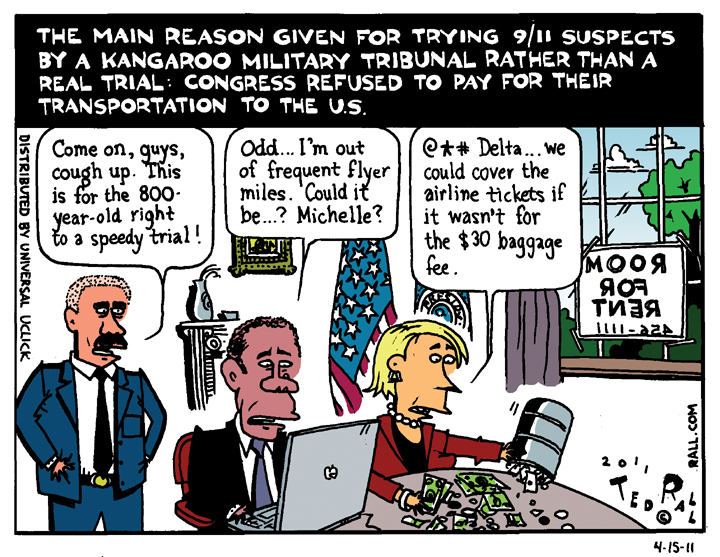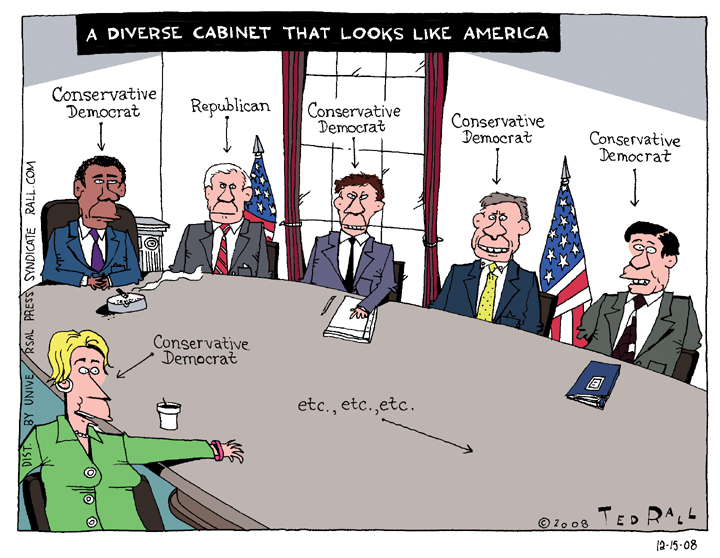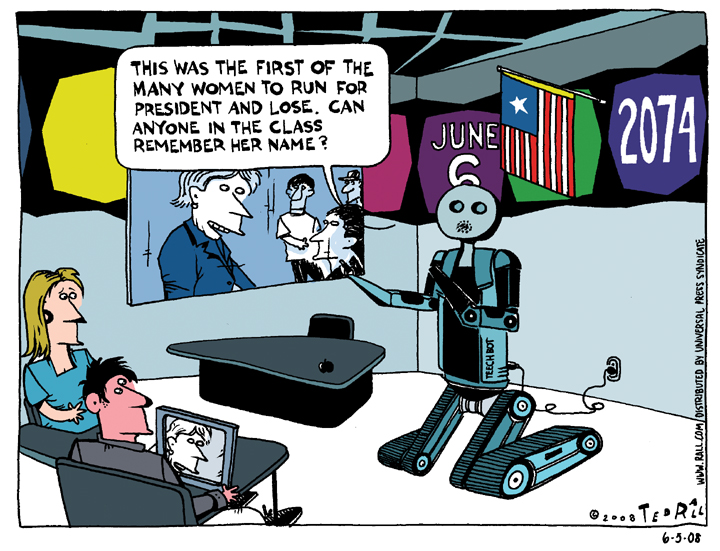Hillary Clinton’s One-Woman Affirmative Action Program
The last few weeks have seen a full-court press by MSNBC and other Democratic media organs to either — one can’t be sure which, but it’s definitely one or the other – promote Hillary Clinton as the Party’s 2016 standard bearer or run her up the flagpole to see if anybody salutes.
Another Clinton? Sounds pretty boring to me. But no, proto-pro-Hillary forces assure us that promoting Madame Secretary to First-Ever Female President is an inherently exciting prospect, a history-making thrillapalooza that would smash glass ceilings, change everything in Washington, and remove waxy buildup.
“The enthusiasm and hunger for a Hillary Clinton presidency is unlike anything I’ve ever seen,” enthuses strategist/pundit James Carville, who just slapped together a Hillary PAC to raise cash for 2016.
I don’t know about you, but the fact that the female One owes her political career entirely to having been married – and not particularly well married – to a president doesn’t exactly strike me as a glorious victory for feminism. Again, Carville and the gang, most irritatingly and recently centered around Tina Brown (another supposedly successful woman who married her way into prosperity), are sure sure sure that installing a commander-in-chief with XX chromosomes represents a magic game changer.
Or that we’ll think that it does.
“Even more than her husband, Hillary has become a symbol of something larger than herself,” one of Brown’s Daily Beast house web “reporters” swooned in a bit of puff that Kim Jong-un would deem too over-the-top. “[Hillary Clinton] is an embodiment of baby-boom second-wave feminists who see her elevation to the pinnacle of world affairs as their own story writ large. Now, they want to see her in the White House so they can die happy.”
Maybe we should let them die alone and in pain.
We have four-plus years of this guy from Chicago with a big shit-eating grin to prove that demographic novelty hardly guarantees ideological progress. (Sorry, long-term unemployed. You’re welcome, Wall Street.) And the passing of former Margaret “1,000,000 fired miners” Thatcher reminds us that estrogen isn’t enough if you’re a liberal, much less a progressive, hoping to reform capitalism into something slightly less heartless.
We’ve traveled down Clinton Inevitability Road before.
Democrats took a long, hard look at her in 2008 and in the words of one of the most tasteless T-shirts I have ever seen, consciously and decisively chose “bros before hos.” Voters asked to reconsider the current Secretary of State are being asked to forget that they rejected her.
They’re also being asked to forget her awful record: botching healthcare reform in 1993 by ginning up a convoluted system designed to line the pockets of the big insurance companies in Hartford, voting not just for the disastrous lost war against Afghanistan but the Iraq fiasco, and the minor detail that when it comes to affirmative, actual accomplishment as a US Senator and now Secretary of State, there isn’t a lot to look at.
Yeah, yeah, we’ve all heard the MSNBC talking point. Hillary has done an amazing job as Secretary of State, she’s so competent, she’s worked so hard. “She traveled tirelessly, visiting more countries than any of her predecessors did and cementing her reputation as a serious and inspirational figure in her own right,” says Tina’s Beast. But really, so what? So she logged a bunch of frequent flyer miles. And?
Where’s her signature achievement as a diplomat, the big peace agreement, the disarmament success, the new detente? Why isn’t she taking up Iran on its offers to reestablish diplomatic relations? Why has she made no progress on the Israel-Palestinian conflict? Henry Kissinger had the Paris peace talks, SALT and opening ties with communist China, yet he was still a monstrous war criminal who deserves to be retroactively executed – and yeah, he’s a giant next to Hillary.
The Hillary for President bandwagon looks and feels an awful lot like the Obama campaign while it was revving up in 2006. Once again, we’re seeing an attempt to seduce voters with politically-correct tokenism.
We were supposed to overlook Obama’s inexperience (oh the irony, Hillary warned us about that during the 2008 primaries, and on that she was so so right) and brazen hypocrisy (his entire candidacy was predicated on his “opposition” to the Iraq war, which he repeatedly voted to fund, never voting no once) because he was, you know, black. That, and youngish. I had the same argument with so many of my liberal friends back in 2008, and they all told me the same thing: Obama looks different, so he feels different, thus he will be different.
My liberal friends are sad now. And many, many Afghans, Iraqis, Yemenis, Pakistanis – there are so many of them – are as dead as the American economy.
This time Democrats are being asked to overlook Hillary’s – not inexperience, she’s definitely been around Washington –lack of accomplishment. They want us to forget that, far from undermining patriarchy, a vote for Hillary Clinton would reinforce it by passing over millions of brilliant women who really did make it on their own. Once again, not being an old white Ivy-educated Protestant male is supposed to masquerade as inherently imminent change, a radically safe affirmative-action program for the benefit of a single individual substituting for actual policies.
Haven’t we learned anything from Condi Rice or Colin Powell? Let’s stop judging politicians by the color of their skin — or the curve of their breasts — but by their lack of character.
This ridiculous system, presided over by out-of-touch hacks, keeps trotting out the transparently absurd argument that being a white Ivy-educated Protestant female guarantees something awesome. What and how, no one can say. Just vote for her. Hope for the best. Shut up.
What’s disturbing about the Rise of Hillary Part 2 is that it’s all personality, no politics. Economy? No comment. Environment? Nothing to say. Secretary is a celebrity, all image, no vision for where she wants to lead us. And the media thinks it’s peachy.
The days when politicians broke promises are long gone; betrayal of principles seems quaint now that there are no principles on offer to sell out. Now there are no promises during campaign season, only platitudes. There are no policies, only avatars.
Look! She’s a woman!
The pre-race for the 2016 Democratic nomination is being promoted not as a clash between visions, as we saw in 1980 between Jimmy Carter’s Southern centrism and Ted Kennedy’s classic New England liberalism, but as a friendly rivalry.
The nomination is Hillary’s if she wants it, so much so that Joe Biden won’t run if she does. How would a second President Clinton be different from a first President Biden? Does either one have a jobs program? No one’s asking.
The race for Leader of the Free World has been reduced to jostling between two suits in the executive suite, girls against boys, angling for a CEO slot scheduled to open up. Which is fine. What I don’t get is: why are we supposed to pay attention?
(Ted Rall’s website is tedrall.com. His book “After We Kill You, We Will Welcome You Back As Honored Guests: Unembedded in Afghanistan” will be released in November by Farrar, Straus & Giroux.)
COPYRIGHT 2013 TED RALL



